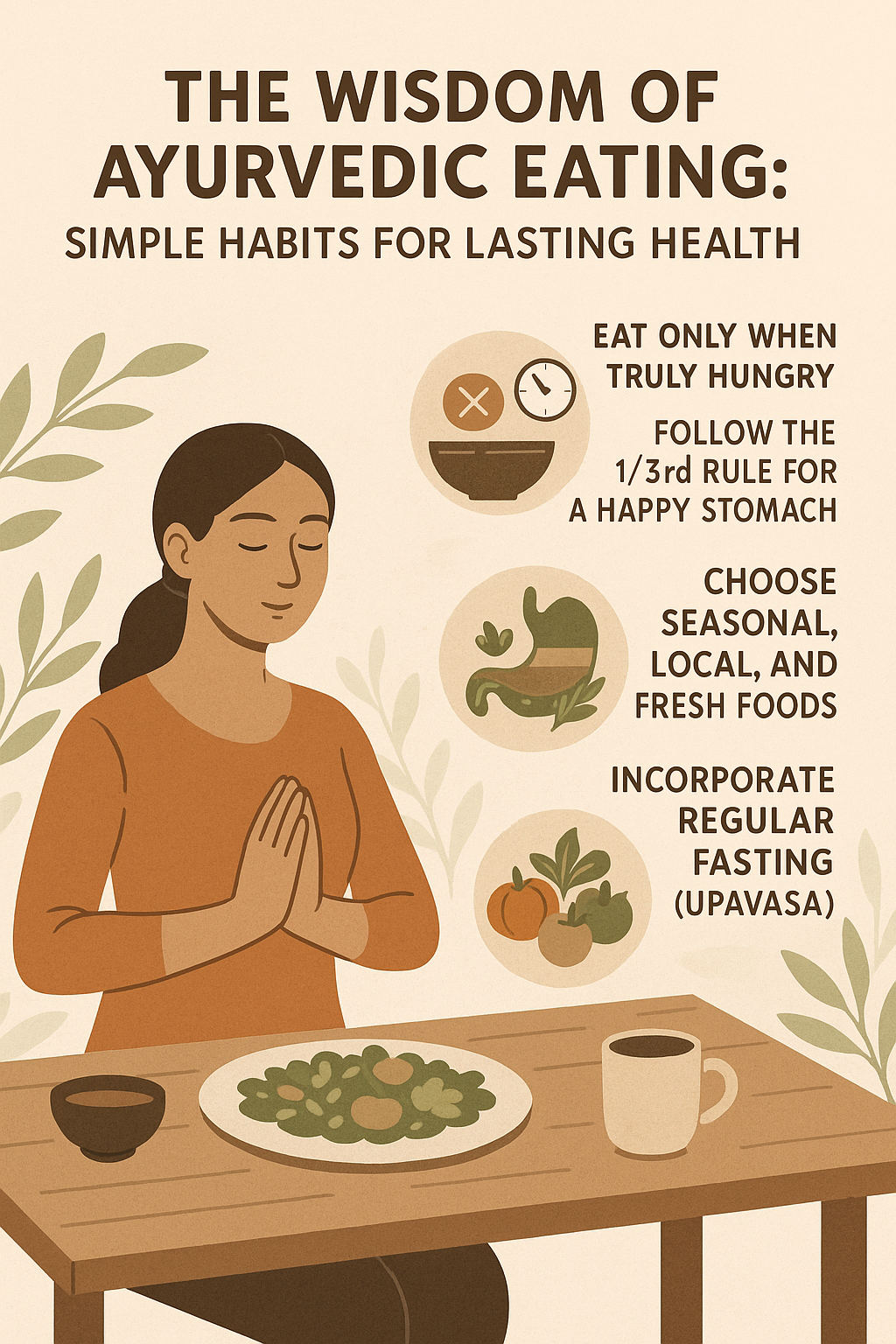
The Wisdom of Ayurvedic Eating: Simple Habits for Lasting Health

The Wisdom of Ayurvedic Eating: Simple Habits for Lasting Health
The Wisdom of Ayurvedic Eating: Simple Habits for Lasting Health
In the age of fast food and faster lifestyles, Ayurveda invites us to slow down, listen to our bodies, and eat with mindfulness. Rooted in ancient Indian wisdom, Ayurvedic eating is not about strict diets, but about syncing with nature and respecting our body’s unique needs. Here are timeless tips inspired by Ayurveda to guide you toward better digestion, clearer thinking, and deeper well-being.
1. Eat Only When Truly Hungry
Ayurveda teaches that true hunger is a signal from our internal digestive fire (Agni), not from habit or emotion. Eating without hunger burdens the system and creates toxins (Ama). Before reaching for a snack, pause and ask: am I physically hungry or just bored or stressed?
2. Follow the 1/3rd Rule for a Happy Stomach
According to the Charaka Samhita, an ancient Ayurvedic text, you should fill your stomach one-third with solid food, one-third with liquid, and leave the remaining third empty. This balance allows proper digestion and prevents discomfort or sluggishness after meals.
3. Choose Seasonal, Local, and Fresh Foods
Nature provides exactly what our body needs in every season. Cooling fruits in summer, warming spices in winter—seasonal foods naturally balance our doshas (body energies). Fresh and local ingredients also retain more prana (life force), supporting vitality and digestion.
4. Incorporate Regular Fasting (Upavasa)
Fasting isn’t about deprivation—it's about rest. A weekly or fortnightly fast, or even practicing Laghu Bhojana (light eating), gives the digestive system time to reset, clears accumulated toxins (Ama), and improves mental clarity. It’s a simple yet powerful practice to reconnect with your body.
5. Avoid Heavy or Reheated Food at Night
Evening is the time when our digestion slows down. Consuming stale, oily, or reheated food at night leads to toxin buildup and mental dullness (Tamas). Choose light, freshly cooked meals in the evening for a better night’s rest and a clearer morning mind.
6. Eat with Full Attention
In Ayurveda, how you eat is just as important as what you eat. Make mealtimes sacred—free from screens, scrolling, or multitasking. Eating mindfully enhances digestion, satisfaction, and the connection with your food.
7. Start Light When Extremely Hungry
When your hunger feels intense, start your meal with easily digestible foods like fruits or salads. These light foods awaken the digestive fire (Agni) gently, preparing the body for heavier items.
8. Spice It Up with Digestive Herbs
Simple kitchen spices like ginger, black pepper, and cumin are Ayurvedic allies. They kindle Agni, help absorb nutrients, and prevent bloating. A pinch of these in your meals can make a big difference.
Final Thoughts
Ayurvedic eating is not about strict rules but about reconnecting with natural rhythms. It invites us to honor our body, our environment, and the act of nourishment. By making small shifts—eating when hungry, choosing fresh foods, or practicing mindful meals—you can transform your relationship with food and experience deeper vitality every day.

 by Shivam
by Shivam 




